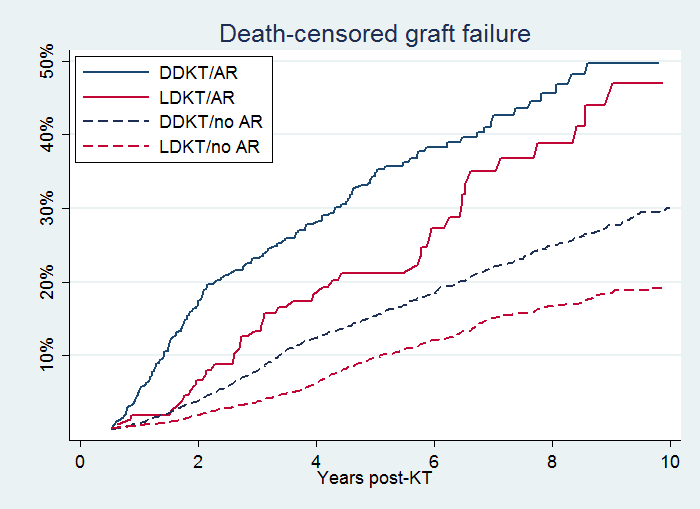Acute Cellar Rejection and Long-Term Graft Survival in Pediatric Kidney Transplant Recipients.
JHU, Baltimore
Meeting: 2017 American Transplant Congress
Abstract number: 67
Keywords: Kidney
Session Information
Session Name: Concurrent Session: Kidney: Pediatric Immune Injury and Recurrent Disease
Session Type: Concurrent Session
Date: Sunday, April 30, 2017
Session Time: 2:30pm-4:00pm
 Presentation Time: 3:42pm-3:54pm
Presentation Time: 3:42pm-3:54pm
Location: E451a
The association between acute cellular rejection and long-term graft loss among pediatric kidney transplant recipients has not been quantified.
Methods: Using SRTR data 2005-2015 and Cox regression, we studied the association between acute rejection in the first six months (AR6) and death-censored graft failure (DCGF) in 3,971 deceased donor kidney transplant (DDKT) and 2,473 living donor kidney transplant (LDKT) recipients who were age<18 years at transplant and who had at least 6 months of graft survival. Models were adjusted for recipient characteristics, and for deceased donor KDPI (DDKT) / living donor KDPI (LDKT).
Results: 8.8% of DDKT recipients, and 6.2% of LDKT recipients, experienced AR6. Recipients with AR6 had higher risk of DCGF (cumulative incidence at 10 years = 49.7% vs 30.0% for DDKT recipients, 47.0% vs 19% for LDKT recipients; both logrank p<0.001) (Figure). Among DDKT recipients, AR6 was associated with sixfold increase of DCGF in the first year post-KT (aHR=3.2 5.9 10.7, p<0.001). This association attenuated over time (aHR for 1-3 years post-KT = 2.1 2.8 3.7, p<0.001) but remained statistically significant past 3 years post-KT (aHR=1.1 1.6 2.1, p<0.01). Among LDKT recipients, AR6 was associated with 2.5-fold higher risk of DCGF (aHR=1.872.4 3.4, p<0.001). There was no evidence that the association between AR6 and DCGF changed over time among LDKT recipients (likelihood ratio p=0.11).
Discussion: Acute cellular rejection is associated with dramatically higher risk of long-term graft loss among pediatric DDKT and LDKT recipients. This persistent risk of graft loss is consistent with mechanistic theories that acute cellular rejection primes the immune system for later development of de novo DSA and subsequent allograft injury. Aggressive early immunosuppression to avoid early acute rejection may prolong graft survival in pediatric recipients.
CITATION INFORMATION: Massie A, Garonzik-Wang J, Desai N, Segev D. Acute Cellar Rejection and Long-Term Graft Survival in Pediatric Kidney Transplant Recipients. Am J Transplant. 2017;17 (suppl 3).
To cite this abstract in AMA style:
Massie A, Garonzik-Wang J, Desai N, Segev D. Acute Cellar Rejection and Long-Term Graft Survival in Pediatric Kidney Transplant Recipients. [abstract]. Am J Transplant. 2017; 17 (suppl 3). https://atcmeetingabstracts.com/abstract/acute-cellar-rejection-and-long-term-graft-survival-in-pediatric-kidney-transplant-recipients/. Accessed February 27, 2026.« Back to 2017 American Transplant Congress
